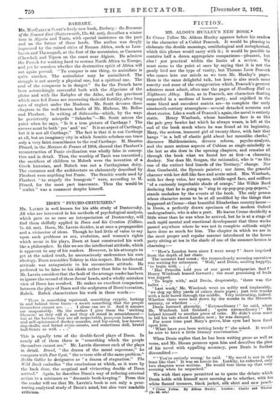IBSEN " PSYCHO-GRITICIZED."
MR. LAVRD7 is well known for his able study of Dostoevsky. All who are interested in his methods of psychological analysis, which gave us so sane an interpretation of Dostoevsky, will find them skilfully applied in Ibsen and his Creation (Collins.
is. 6d. net). Ibsen, Mr. Lavrin decides, is at once a propagandist and a vivisector of ideas. Though he had little of value to say upon such problems as sex, evolution, and women's rights which occur in his plays, Ibsen at least constructed his work like a philosopher. In this we see the intellectual attitude, which is apparent to any of his readers. However, in his attempts to get at the naked truth, he unconsciously undermines his own ideology. Ibsen resembles Tolstoy in this respect. His intellectual attitude was antagonistic to his unconscious attitude. He preferred to be false to his ideals rather than false to himself.
Mr. Lavrin considers that the fault of the average reader has been to ignore the second of these Janus' heads, and a wholly mistaken view of Ibsen has resulted. He makes an excellent comparison between the plays of Ibsen and the sculptures of Ibsen's creation, Rubek. Rubek characterizes his work in these words :-
" There is something equivocal, something cryptic, lurking in and behind these busts—a secret something that the people themselves cannot see. . . . I alone can see it. And it amuses me unspeakably. On the surface I give them the ' striking likeness,' as they call it, and they all stand in astonishment— but at the bottom they are all respectable, pompous horse-faces, and self-opinionated donkey-muzzles, and lop-eared, low-browed clog-skulls, and fatted swine-snouts, and sometimes dull, brutal bull-fronts as well. . . ."
This is equally true of the double-faced plays of Ibsen. In nearly all of them there is " something which the people themselves cannot see." Mr. Lavrin discusses each of the plays in detail. Brand, " the drama of the moral superman," he compares with Peer Gynt," the reverse side of the same problem." Iledda Gabler he designates as " a drama of stagnation." The Wild Duck embodies "the conclusions at which, as it were by the back door, the sceptical and vivisecting double of Ibsen arrived." Again, he describes Ibsen's way of reducing external action to a minimum as " dramatic book-keeping." From this
the reader will see that Mr. Lavrin's book is not only a pene- trating analytical study of Ibsen's mind, but also very readable criticism.










































 Previous page
Previous page